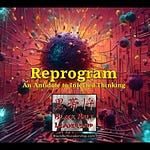From the early, formative years of our lives, it’s a common theme we heard from our parents as children. We heard it when we were caught, climbing up the back of a chair to get onto the countertop so we could get to the cookie jar on top of the refrigerator. We heard it when we found Dad’s ladder and got caught climbing up onto the roof.
Three emblematic words, with the best of intentions, to keep us safe. .
Don’t do it!
Think back to your own past. How many times do you recall a parent, grandparent, aunt or uncle, teacher, pastor, priest, rabbi, or another authority figure in your life speaking those three cautionary words:
Don’t do it!
Three simple words, intended for our safety, came to epitomize the limitations parents and authority figures put on our lives. Often, there was a well-founded rationale behind those words. Parents don’t want us falling off a roof, gorging on cookies, sticking a knife in an electrical outlet, walking aimlessly into a busy street, or jumping into a swimming pool or creek when we don’t yet know how to swim.
Don’t do it!
For many of us, that extended into what our parents wanted us to see, hear, and speak. There were certain shows, at least in my parent’s house, that were taboo. There were certain types of magazines my parents didn’t want me to see. There were certain types of music my parents didn’t want me to listen to, and there were certain words they did not want to hear coming from my mouth.
Don’t do it!
This was our parents’ best effort to instill morals, values, beliefs, and character in our lives. It was their attempt to teach us proper ways of conduct and expected norms of behavior, both in public and in private. It teaches us to value ourselves and others.
But, there were times when perhaps we were told not to do certain things as children or teens (or even as adults) that simply didn’t make sense. For example, my mom relayed a story to me many times about her father telling her she couldn’t get in the creek until she learned how to swim. Or, the time he told her she couldn’t get behind the wheel of a car until she learned how to drive.
Perhaps that’s why my mom never learned to swim and didn’t learn how to drive until she enrolled herself in a summer driver’s education course at the age of 35.
When we’re told again and again, “Don’t do it,” it can have the unintended consequence of limiting our lives in unexpected ways. Remember, we are creatures of habit and if we have been conditioned with limiting beliefs or resistance to investigate, explore, and attempt what hasn’t been done before, we’ve been programmed for mediocrity.
Sadly, far too many of us have grown accustomed to average.
Good enough is good enough, and that’s good enough.
This is NOT a recipe for success.
I recently shared a stage with Al Caicedo, a highly successful financial professional who has shared his wisdom and insights on CNBC, Fox Business, and other major media outlets. As he was engaging an audience of financial professionals, Al made a powerful statement that ties directly into the world of “Don’t do it.”
“The industry always pushes back against the next thing.”
As I thought through my more than three decades of sales coaching and training in the financial services space, I have to concur. Thirty years ago, career organizations like Prudential taught new recruits to make a list of 100 people and network through that list to get started building a referral-based business. They also taught the “One Card” system – an antiquated paper version of a CRM to track leads, appointments, and annual reviews.
Fast forward about a decade later, and the focus shifted to seminars in libraries, hotels, community centers, churches, or other meeting venues. The presenter would share an educational message, take questions from the audience, extend an offer to meet, schedule appointments, and meet with the prospects in his office or their home.
The Old Guard pushed back against the seminar approach, seeking to defend what was working for them and remain relevant in the marketplace.
Don’t do it!
Then, the shift to a seminar-and-a-meal approach, offering prospective clients an opportunity to enjoy a complimentary dinner with a seminar presentation to follow. The presenter would share an educational message, extend an offer to meet, book appointments at the restaurant, and then meet with prospects in his office or the prospect’s home.
Once again, the “New Old Guard” protested, arguing that people were only going to come for the food and would never buy as a result of a dinner seminar event.
Don’t do it!
Technological advances now made it possible to deliver seminars online, and the Webinar was the new fad in the industry. Prospects didn’t have to drive across town, they could attend from the comfort and privacy of their own home. The presenter would share an educational message, book appointments with those who were interested, and visit them either in his office or the prospect’s home.
Once again, the “New New Old Guard” balked, arguing that people would not show up for an online event and stick around long enough for this to be a viable selling model.
Don’t do it!
As technology has continued to advance, cutting-edge financial professionals are discovering new and innovative ways to engage with clients and prospects. Facebook Live, LinkedIn, Social Media Marketing, and Virtual Workshops. The presenter would share an educational message, schedule appointments, and engage with prospects via Zoom, Teams, or GoTo, avoiding the need for either party to travel.
Once again, the New, New, New Old Guard pushes back, warning that consumers wanted face-to-face interactions with a financial professional before they would buy, and stressed that consumers were unwilling to engage in financial planning over a video streaming platform or do business virtually.
Don’t do it!
In each of these scenarios, the “Establishment” sought to defend the status quo. They wanted to keep things as they were. It was comfortable, it was working, and it was at some level successful. Why change?
This feeds into the programming we were soft-wired with during the early, formative years of our lives. We were trained to tread carefully, stay inside the lines, don’t take risks, and avoid that which is unknown, unfamiliar, unpredictable, or uncomfortable. This reinforces our primal instinct for self-preservation and sadly trains us to see any opportunity to learn, grow, or improve as something we should not do.
This stymies our growth, limits our potential, and restrains us from pursuing opportunity.
When we stop forward thinking, we stop moving forward.
When “Don’t do it” becomes the accepted mode of behavior, we start seeing the world through the lens of what we can’t do (or shouldn’t try to do) rather than what we can do, or what we could attempt to do. This is the formula for an average, mediocre, or lackluster life.
Are you OK with that?
So, how do we overcome the “Don’t do that” mindset? How do we shift from what we can’t or shouldn’t do to embrace a world of I can and I will?
Let’s go back to our childhood.
When our parents were telling us “Don’t do it,” they were attempting to quell our curiosity.
My inquisitive nature caused me to consider how I could get to the cookie jar on top of the refrigerator, climb to the top of the big tree in the backyard, explore the wooded area at the edge of town, swing from a rope (like Tarzan) and plunge into a creek in the middle of nowhere, or jump from a bluff into the fast-flowing river below.
Our parents, with the best of intentions, began to stifle our curiosity, negate our inquisitive nature, and embrace the safety of the status quo as essential to our welfare and well-being. As such, “Don’t do it” became a way of life, holding us back from living a life committed to asking the question “What’s Next” and exploring what that looks like.
As a result, we end up making excuses when the next thing comes along and challenges the status quo as we’ve grown to accept it. Those excuses can take the form of:
· Reasons why we can’t
· Reasons why we’ll fail
· All our inadequacies that limit our potential
It’s our mind, subconsciously responding to our “Don’t do it” programming, leaving us stuck, where we are, as we are, unchanged.
It’s why far too many extraordinary people end up living ordinary lives.
It’s why we accept average, mediocre, and lackluster as normal.
This is NOT a recipe for success.
So, how do we reprogram our minds to eliminate “Don’t do it” from our thinking?
Personal growth.
Black Belt Leaders are committed to daily becoming a better version of themselves every single day. Why? Because personal growth is the setup for the next thing.
Daily growth reignites our curious, inquisitive nature. It enhances the quality of our thinking, thereby enhancing the quality of our saying, doing, and becoming. Daily growth is the relentless pursuit of excellence as we get comfortable living in that uncomfortable place where growth happens.
When we are engaging daily in personal growth activities, we are willingly venturing into the unknown, the unfamiliar, the uncomfortable, and the uncommon. It’s there we stretch the quality of our thinking and discover that we are capable of saying, doing, and becoming more. We elevate our belief in ourselves and what we are capable of accomplishing.
We reprogram our thoughts to reject “Don’t do it” thinking and embrace “I can do it” thinking.
95% of the world is content to live in the world of “Don’t do it” and remain where they are, as they are, living far below their potential. These are the people who are constantly pushing back against the next thing and are content to let opportunity after opportunity pass them by.
Don’t let them dictate what success looks like for you.
Remember, success only happens outside your comfort zone.
Ordinary people become extraordinary when they are willing to say, do, and become what ordinary people won’t.
As my friend and mentor, Chris Robinson, says, “It’s not that you can’t, but that you won’t, and that choice is yours.”
Choose to say NO to “Don’t do it” and start to say YES to “I can do this” and watch what happens in your life. Daily personal growth makes that possible, as it stretches your belief in what’s possible, and boosts your confidence to get comfortable in that uncomfortable place where growth happens, and opportunity exists.












Share this post